- Home
- Brian Falkner
Brain Jack Page 22
Brain Jack Read online
Page 22
46 | RECOVERY
They took turns sitting with him, but it was Sam who was at Tyler’s side when his eyes finally opened, wincing against the light from the window.
“Sam,” he said in a voice that sounded like dry skin rubbing deep in his throat.
“Don’t talk,” Sam said, but Tyler took no notice.
He took a sip of water from a glass by his bed, then another, wincing each time he had to swallow. “I spent the first day trying to find a car that worked, but their computers were all fried from the blast. Then I figured that the cars in Indian Springs might have escaped the EMP, so I tried to walk there.”
“You nearly died,” Sam said.
“When I was lying in the desert, after my legs gave out,” Tyler said, “there were all these mad dreams chasing around inside my head.”
“Delirious with the heat, I expect,” said Sam.
“Seemed real at the time,” Tyler said. “Which got me thinking about that memory of you and Dodge running out of the swamp. Vienna was right—I should have felt angry or shocked, but I didn’t. It’s just like a movie clip inside my head.”
“It never happened that way,” Sam said.
“And there were some other memories too,” Tyler said. “Memories about stuff that Dodge had done in the past. Stuff that should have made me dislike him or at least distrust him. But I don’t. I’ve always liked Dodge. Why would I feel that way if he had done bad things in the past?”
“She did that to you,” Sam said.
“Who? This Ursula creature that you keep talking about?”
“Yeah,” Sam said.
Tyler closed his eyes and laid his head back weakly on the pillow. “She’s been poking around inside my head. That ain’t right.”
“She’s gotta be stopped,” Sam agreed.
47 | MEMORIES
The neuro-headset sat on a cradle beside the computer screen. Jaggard stared at it without enthusiasm.
He knew things he shouldn’t know. He had seen things he could not possibly have seen, and he could not understand how this could be so.
He had images in his head of a Ford pickup truck. An F-150 crew cab with off-road suspension. It was missing, stolen, from a north city car dealership. But how did he know that?
He clearly remembered seeing the same vehicle cruise past him in Fremont, although he had been nowhere near Fremont in the last few weeks. It was dark, but not so dark that he could not recognize Vienna at the wheel of the truck.
Even stranger was his recollection of the vehicle nearly colliding with him in Jean. He was driving a car, a small Honda.
It was dark, and he had forgotten to switch on his lights.
Suddenly, lights from another car were bearing down on him, and he had slammed on the brakes to see the big Ford pickup truck whistle past just in front of his nose.
The memory was vivid, yet he had never been to Jean and did not drive a small Honda.
He remembered seeing the pickup truck turn onto the old Boulevard in Las Vegas, which was the next strange thing to happen. Nobody went out along the Boulevard anymore. There was nothing there. Not anymore.
Just the contamination zone.
These memories were not his. That was clear to him. They were memories of other people, somehow filtering through to him as those people reconnected to the neuro-network.
Gasgoine entered without knocking and sat in the chair in front of Jaggard’s desk, leaning forward and resting his elbows on the desk.
“I need you to report progress,” he said. “How could it possibly take more than two weeks to find a bunch of teenagers and a missing agent?”
“I’ve located them,” Jaggard said, still not sure how he had done so. “Just now, the information has come through. They’re in Las Vegas.”
48 | THE COMING OF THE WAR
The wheels of the golf cart kicked up a squall of deadly Vegas dust, which was caught by the gusting breeze and pattered against the fabric of Sam’s hazmat suit. Vienna sat beside him, holding the Geiger counter. It began to buzz but subsided rapidly as the gust of wind fell away. Sam found he had held his breath instinctively, although he knew the mask was protection enough.
They’d found a whole garage full of the golf carts. They were small, quick, and nimble, ideal for maneuvering around the city, especially on short expeditions like this shopping trip to stock up on supplies for their run to Cheyenne Mountain.
A strip mall, almost intact, rose on their left, and Sam gazed up at the broken billboards above, then at the scattered shelving in the first of the stores. A minibus lay on its side in the street, and he skirted around it.
They drove in silence. It was strange, Sam thought, to be so close and yet so distant. He was merely inches away from her but was separated by the gulf of the hazmat suits and the particles of radioactive dust that swirled around and between them. “Vienna,” he started, a little uncomfortably.
“Yeah?”
“The other night, when we were watching the planes …” He paused, unsure how to continue.
“It was your birthday. I gave you a birthday kiss. Don’t worry about it,” she said brusquely, but a turn of her head revealed a coy smile through the face mask.
“I really—”
“Stop!” Vienna said, and Sam took his foot off the pedal, activating the brake automatically. The cart skidded a few feet in the dust and stopped.
“What?”
“Shh!” She looked up.
A strange distant humming sound deepened and turned into a roar overhead. “Jets!” Sam said.
“Get out of sight!” Vienna yelled as three jet fighters flying in tight formation appeared in the distance. They were flying low, beneath the omnipresent haze of the oil fires.
Vienna dived for the cover of the wrecked minibus. Sam leaped off the cart and ran into the entranceway of a store.
Vienna called, “Stay under cover. We can’t risk being picked up on reconnaissance cameras.”
At that moment, a second set of jets appeared, emerging from the smoky sky as if materializing from another dimension. Four planes in this group, in a V-shaped formation, on an intercept course with the other fighters.
Must be joining up with the group, Sam thought, although that thought shattered as the first group broke and scattered, turning toward the oncoming fighters.
A moment later, there were bright flashes from the first planes and tiny trails of smoke streaked out from their wings.
One of the oncoming jets exploded in flames, but the others managed to dodge the hail of fire and responded with missiles of their own.
The jets jinked and dived or rocketed toward the heavens, avoiding the missiles and each other by what seemed like inches.
It was all over in seconds as two of the first group of jets exploded in fiery balls, debris raining down over the city. The remaining fighter turned tail and ran, hotly pursued by the remaining three from the second group.
“Someone has started a war,” Sam yelled out as the thundering crashes of the explosions finally reached them. But who was winning? he thought.
Vienna stood up behind the minibus, watching the departing jets.
Sam, however, stayed put, not yet daring to emerge from his hiding place in case the jets should return. His eyes scanned the horizon, watching the shrinking dots until they disappeared into the haze.
The danger, when it came, though, was not from the sky but from the land.
Two gray vans were sliding to a halt in front of him before he even knew they were there, his eyes still focused on the sky.
Tactical team soldiers poured into the street in shiny silver radiation suits and full face masks.
They were heading for Vienna and hadn’t yet noticed Sam, crouched and unmoving inside the ruined store. Sun reflected off visors, silver flashed, and black boots kicked up dust as they ran past his hideout.
Vienna saw them and turned to run, but it was already too late.
Sam saw her struggling in the arms of one of the soldiers, hi
s arm up around her neck.
She twisted and scratched, and suddenly she was free, her hazmat suit tearing and the hood, complete with the mask, coming off in the soldier’s hands.
She ran into the maze of broken and crushed buildings, through the billowing cloud of dust kicked up by the tires of the vans, as shots rang out and puffs of masonry powder punched out of the rubble around her.
Sam watched helplessly as Vienna ran through the clouds of radioactive dust without her protective hood. Without her mask.
49 | STICKS AND STONES
Sam looked around desperately. The shelter had turned into a trap.
If they hadn’t seen him yet, they would any second.
There was a small gap at the rear of the store, at the apex of the fallen rear concrete wall. Barely enough room for a person, and had he been a little thicker around the middle, he would not have made it through, but he did, taking care not to scratch or tear his safety suit as he did so.
The terrible image of Vienna running through the clouds of dust without her hood or mask was seared into his mind.
He dived to the side of the narrow gap as shouts sounded behind him.
He was in a low space: what had perhaps been the floor of a warehouse or factory but was now just a few feet high. The floor was not flat but was a cratered moonscape of bricks, concrete fragments, and dust.
Light beckoned to the right-hand side, and he clambered over toward it.
The space suddenly sang with the rapid report of full automatic fire, incredibly loud in the restricted space. Crushed bricks and rubble danced around him.
A bullet kicked up dust by his hand.
One bullet—that would be all it took.
He scrabbled over toward the light and eased himself out through a large crack in the side of the building into daylight. He had to get back and warn Dodge before they located the house.
Sweat from the exertion was already fogging his mask, but there was nothing he could do about that. He ran awkwardly through the jagged landscape, glancing around behind him to check for pursuers.
The deeper he ventured into the maze of crushed buildings, the harder it would be for them to find him. He took one twisted pathway after another, climbing over, around, or under the demolished structures.
Two soldiers appeared over to his right from behind a broken wall. He ducked behind a wooden door, blown from its hinges but otherwise intact.
The soldiers moved out of sight, and he skirted around to the left, trying to keep some distance between them and himself.
Sometimes he could tell whether he was outside or inside a building; other times the difference was not so clear.
The nuclear bomb had taken bits from everywhere and jumbled them together in indiscriminate piles. He clambered over the wrecked shell of a late-model car that was in the bedroom of a burned-out house. A roulette wheel was embedded in a brick wall a little farther on, flung halfway across the city by the force of the explosion.
He heard distant shots and wondered who they were shooting at.
Vienna?
Occasionally, he came to a road, although the roads were so strewn with rubble and masonry that they were no easier to pass than the broken buildings.
The farther he got from the hypocenter, however, the clearer the roads became. The buildings here had collapsed in on themselves rather than being blasted from their foundations.
He could tell from the mountains and the position of the sun the approximate direction in which to travel, but it was still a relief when he found himself on streets he recognized, close to the golf course.
Sam sprinted as fast as he could. He was surely far enough away from the searchers now that speed was more important than stealth.
He spun around a corner and kept running, his heart pounding and his breath coming in harsh bursts. Sam was halfway toward the road when he heard the sound of an engine, and one of the gray vans turned the corner behind him.
A crush of timber blocked the center of the street, blown there from a nearby lumber yard; he climbed over it, conscious that the van could not follow.
Crumbled walls of a large building, maybe a factory, rose to his right, and on the left was a jungle of jagged timber and overturned shipping containers.
He could not go left. He could not go right. When he heard the shout and a single bullet whined off the tarmac by his foot, he stopped.
There was nowhere to go.
The soldier stood on top of the pile of wood, his rifle aimed right at Sam’s head.
At this distance, he could not miss. The shot had been a warning, Sam realized. Ursula wanted him alive.
That made sense. She would want to find out what he knew. What they had been up to. What their plans were.
And he knew everything.
He knew about the Plague virus, and he knew about Cheyenne Mountain.
Once they rammed a neuro-headset onto his head, Ursula would know that, too, and their only chance would be gone.
If they captured him alive, that was.
He began to back away from the soldier.
“Don’t move!” the man shouted. “Or I will shoot.”
Two or three other soldiers were climbing up the blockade to join him.
There is no choice, Sam thought with an eerie kind of calm, and took another step.
The man raised the rifle to his eye and sighted along it.
Sam shut his eyes.
Sometimes, as a child, he had wondered what it would be like to be dead. Suddenly dead. Without warning, from a drive-by bullet or a brain aneurysm. One moment you’re charging along at 100 percent, thinking about all kinds of stuff, deciding what you’re going to have for lunch and who you’re going to hang out with after school. And the next minute you’re not.
You’re dead.
You’re not thinking about anything.
You’re not making any plans.
You’re just not.
There was a thud from in front of him, and he opened his eyes in time to see a jagged brick end bounce along the blockade of wood in front of the soldier and crash to the ground.
The man’s gun wavered, and his eyes moved up to the right in time to see a second jagged brick come hurtling toward him, landing just behind him.
His gun pointed in that direction now, along with the weapons of the other soldiers around him, but there was nothing to see. Nothing to fire at.
As Sam watched, another brick, then another, came flying up and over the wall of the ruined factory, hurtling down toward the men.
One of them unleashed a spray of automatic fire in that direction, but the bullets just kicked puffs from the broken concrete wall.
It had to be Dodge on the other side of that wall.
The bricks were flying wild, but just by sheer numbers they were starting to connect.
One hit the barrel of one of the men’s weapons, jolting it from his grasp. A second later, one of the bricks caught the first soldier across the shoulder, tearing a gaping hole in the silvery fabric of the radiation suit.
The soldier grabbed at the tear, trying to pull the fabric back across the hole but to little avail. With a look of panic visible even through the dark glass of his face mask, the soldier turned and stumbled back down on the far side of the junk pile of wood.
That was it, Sam realized. Dodge knew the one thing the soldiers would fear the most: radiation. The rain of half and quarter bricks was constant now as he flung the most primitive weapon of them all against the sophisticated weaponry of the soldiers.
Another soldier took a glancing blow across his helmet, which sliced the fabric of his hood.
Sam turned and ran, zigging and zagging to make it harder for the soldiers to aim, but there were no shots.
He made it to the end of the street and reached the tall wire fence surrounding the golf course. It was at least ten feet high, and he hurled himself at it, hauling himself up and over and dropping down onto the embankment on the other side. He ran into the forest, hopin
g to lose himself amongst the trees before the soldiers could regroup and follow him.
Away from the immediate danger of the men and their guns, the image resurfaced again and again despite his desperate attempts to push it out of his mind: Vienna running through the streets without her hood or mask.
Breathing in the dust.
The radioactive dust.
50 | THE DAM
Dodge met him at the front of the house. Tyler was right behind him, holding the laptop, still looking weak and pale from his ordeal.
“Thanks, Dodge,” Sam said.
He shrugged. “Thank Tyler; it was his idea.”
“We’re leaving,” Sam said. “Now.”
“What about Vienna?”
“I don’t know.”
Sam peeled off his hazmat suit, tossing it into the dry fountain, along with any dust, the residue of his frantic dash through the streets. The others did the same.
Dodge jumped in the driver’s seat of the pickup truck, parked in the courtyard, and Tyler got in the front passenger seat. Sam dived in the back as Dodge gunned the vehicle, spinning the steering wheel as he flung the machine back around onto the narrow road through the forest.
His eye caught a movement as they raced back toward the North Boulder Highway. A lone figure, running, stumbling, falling.
“Vienna!” he shouted.
Dodge had seen her, too, and veered the pickup toward her. Sam jumped out even before they had stopped and hauled her up by one arm.
Her face was gray as he dragged her back toward the pickup and dumped her on the backseat before climbing in beside her.
Dodge took off as Sam was shutting the door, spraying dust into the air behind them.
Vienna coughed and coughed again, bringing up gray mucus.
Sam watched her, horrified. But there was nothing he could do.
“Where are we going?” Tyler asked as the western mountains slid their way around to the right side of the car.
“Head south,” Sam said. “Maybe we can convince them we’re heading for Mexico. As soon as we can, we’ll hide the pickup and change cars. Then we’ll cut east into Arizona and up through New Mexico to Colorado.”

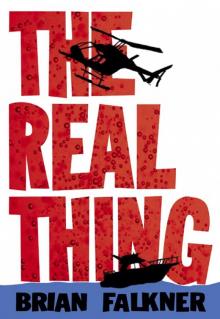 The Real Thing
The Real Thing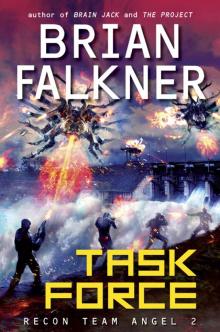 Task Force
Task Force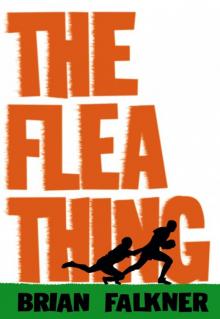 The Flea Thing
The Flea Thing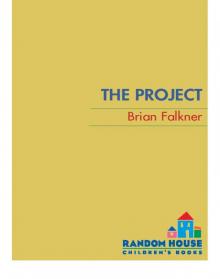 The Project
The Project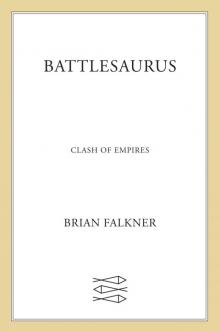 Clash of Empires
Clash of Empires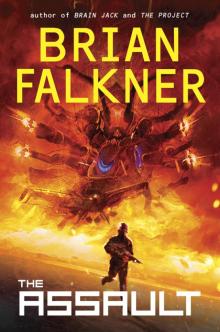 The Assault
The Assault Brain Jack
Brain Jack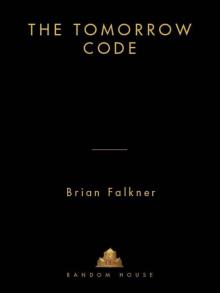 The Tomorrow Code
The Tomorrow Code Vengeance
Vengeance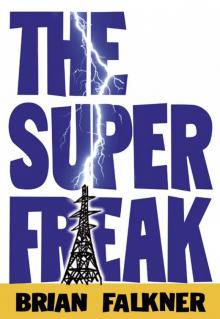 The Super Freak
The Super Freak Northwood
Northwood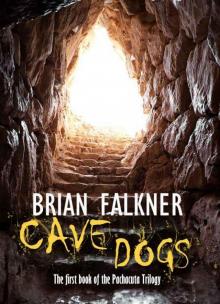 Cave Dogs (Pachacuta Book 1)
Cave Dogs (Pachacuta Book 1)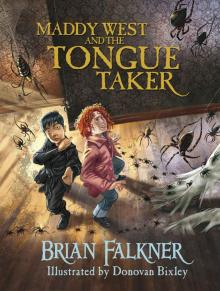 Maddy West and the Tongue Taker
Maddy West and the Tongue Taker